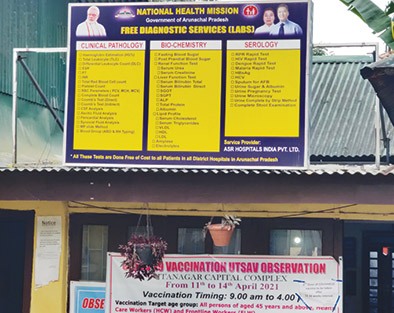Staff Reporter
ITANAGAR, 3 Jul: Diagnostic services are being provided free of cost to the people of Arunachal under the free diagnostic service (FDS) initiative, being implemented by the government of India through the National Health Mission (NHM).
In the state, the FDS initiative is being implemented by the NHM Arunachal through the ASR Diagnostic Group.
The group was selected to provide the services after an open tender was held in February 2019 to start the services in the state. The FDS initiative services are available since October 2019. Till now the services are available at 59 health facilities, mostly district hospitals, CHCs and PHCs, and at the lone medical college of the state, TRIHMS, Naharlagun.
Most of the routine tests are done free of cost under the scheme. However, high-end tests like hormone, tumour markers and histopathology are not included. From October 2019 to February 2021, a total of 1,97,350 samples were tested, and in TRIHMS alone 54,426 samples have been tested.
From only 30-40 sample tests per day at the beginning of the scheme, now the sample test rate at TRIHMS is at an average of 300 per day.
Some of the major hospitals where this service is available in the ICR and Papum Pare are TRIHMS, the Sagalee CHC, the Itafort UPHC, the Chimpu PHC, and the Hollongi PHC. Fifty-three tests recommended by the government of India are being performed free of cost in most of the district hospitals, CHCs and PHCs under this scheme. Clinical pathology, bio-chemistry and serology tests are covered.
“This year, the plan is to expand the free diagnostic scheme to all district hospitals and as many primary health centres as possible. We are planning to increase the number of tests to 56,” informed Dr Bombei Tayeng Toko, nodal officer (public private partnership), NHM, government of Arunachal Pradesh.
She also said that not many citizens are aware of this service and there is a need for wider publicity.
Dr Tayeng Toko also highlighted the main objectives of the FDS initiative. “It is to ensure the availability of a minimum set of diagnostic services free of cost for the needy citizens. Also to improve the overall quality of healthcare and patients’ experience as a result of availability of comprehensive healthcare in public health facilities. To reduce high out-of-pocket expenditure incurred by patients for diagnostics,” she said.



